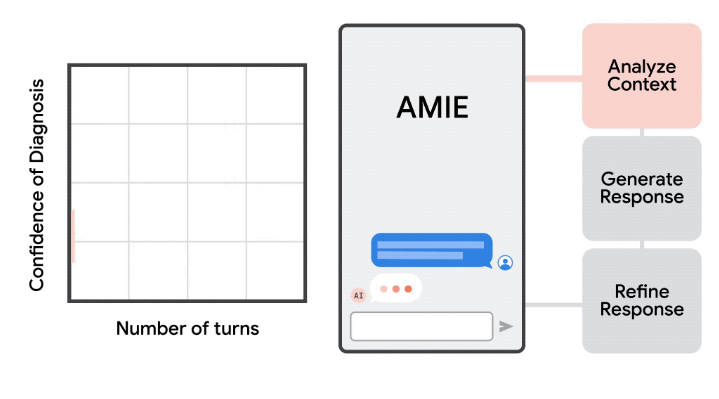AI Chatbot Outperforms Doctors in Simulated Medical Diagnoses: Exploring the Future of Healthcare with Google’s AMIE
In simple terms, researchers have developed an AI system that can chat and diagnose medical conditions, sometimes even better than real doctors. This AI, called AMIE, is based on a Google language model. It’s really good at figuring out what’s wrong with people, especially for heart and lung problems. The AI is also great at listening and showing empathy during these medical chats.
Although this sounds amazing, the AI has only practiced with actors pretending to be patients, not real ones. The creators of AMIE are being careful and want people to understand that it’s still an experimental tool. Even though it’s not ready for actual hospitals or clinics, it could one day make healthcare more accessible to everyone. However, doctors like Adam Rodman from Harvard Medical School remind us that medicine is more than just collecting info, it’s about real human connections.
Training this AI wasn’t easy. The team didn’t have many real doctor-patient talks to learn from, so they had to get creative with their training methods. They made the AI practice being both the patient and the doctor and even act as a critic to improve its conversations.
To see how good AMIE was, the researchers had it do online chats with people trained to act like patients. They compared its performance with that of real doctors. And guess what? AMIE did really well! It was often just as good, or even better, at diagnosing problems than the doctors. But this doesn’t mean Artificial Intelligence is ready to replace doctors. The real doctors in the study might have struggled with chatting by text, something they’re not used to, while the AI could easily write nice, long replies without getting tired.
The next steps for AMIE include making sure it doesn’t have any biases and is fair to all kinds of people. They also need to think about how to test it with real patients and deal with privacy concerns, like where the data is stored and how it’s used. This achievement in AI technology demonstrates a significant step towards fulfilling the goals of AI in enhancing accuracy, efficiency, and empathy in medical consultations.




